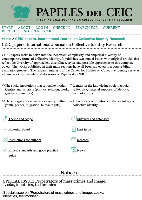
Papeles del CEIC-International Journal on Collective Identity Research
Scope & Guideline
Advancing Knowledge in Social Identity Research
Introduction
Aims and Scopes
- Collective Identity Research:
The journal emphasizes the study of collective identities, examining how these identities are constructed, maintained, and transformed within various social contexts. - Socio-political Dynamics:
Research often focuses on the socio-political dynamics that influence collective identities, including migration, urbanization, and the impact of public policies. - Cultural Narratives:
The journal explores cultural narratives and their role in shaping identities, particularly through literature, art, and media. - Interdisciplinary Approaches:
Utilizing interdisciplinary methodologies, the journal integrates perspectives from sociology, anthropology, political science, and cultural studies to provide comprehensive insights into identity issues. - Regional Focus:
There is a consistent focus on specific geographical contexts, such as Spain and Latin America, addressing regional identities and their global implications.
Trending and Emerging
- Digital Collective Identities:
There is an increasing focus on how digital platforms shape collective identities, particularly through social media activism and digital narratives, reflecting the rise of online communities. - Precarity and Identity:
The theme of precarity—how economic instability affects identity formation—is gaining traction, particularly in relation to housing and social movements. - Intersectionality in Identity Studies:
Emerging research is increasingly addressing intersectionality, examining how various social categories (race, class, gender) intersect to influence identity experiences. - Urban and Rural Identity Dynamics:
A notable trend is the exploration of identities in both urban and rural contexts, particularly how socio-economic changes impact collective identities in these settings. - Migration and Transnational Identities:
The journal is increasingly addressing migration and the formation of transnational identities, highlighting the complexities of belonging in a globalized world.
Declining or Waning
- Traditional National Identities:
Research on traditional national identities appears to be waning, as the journal shifts towards more fluid and hybrid concepts of identity that account for globalization and transnational movements. - Historical Narratives of Conflict:
While historical narratives related to political conflicts were once a central theme, there is less emphasis on these topics, possibly due to a broader interest in contemporary issues and collective actions. - Static Identity Models:
There seems to be a decline in interest in static models of identity that do not consider the dynamic and evolving nature of identities in response to social changes.
Similar Journals

Slovo
Advancing Knowledge in Slavic Languages and HumanitiesSlovo, published by the University College London, School of Slavonic & East European Studies, is a vital scholarly journal dedicated to the exploration of Slavic languages and cultures, as well as the broader social sciences and humanities. Established with a commitment to advancing academic discourse, Slovo serves as a platform for researchers, professionals, and students interested in the dynamic intersections of literature, history, and cultural studies within Slavic and Eastern European contexts. Although it holds a Q4 ranking in both the Arts and Humanities and Social Sciences categories, the journal’s emphasis on fresh perspectives often invites innovative contributions that challenge conventional narratives. While lacking an Open Access option, Slovo remains integral for those seeking to navigate its multifaceted terrain, ensuring that emerging scholars and established academics alike can engage with rigorous research from 2012 to 2023 and beyond. With its headquarters in London, United Kingdom, this journal not only reflects the rich heritage of its academic lineage but also fosters a vibrant community committed to the exploration of Slavic and East European studies.
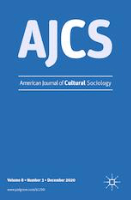
American Journal of Cultural Sociology
Connecting Culture, Society, and PolicyThe American Journal of Cultural Sociology, published by Palgrave Macmillan Ltd, stands as a premier platform for innovative research in the fields of sociology and political science. With an ISSN of 2049-7113 and an E-ISSN of 2049-7121, this journal is renowned for its rigorous peer-reviewed articles that delve into cultural phenomena, social theorization, and policy implications, appealing to researchers, professionals, and students alike. As evidenced by its Q1 ranking in the Sociology and Political Science categories for 2023, the journal is recognized for its high-quality contributions, securing a rank of #185 out of 1466 in Scopus and placing in the 87th percentile of its field. With publication horizons spanning from 2013 to 2024, it continues to advance scholarly conversation and promote interdisciplinary dialogue, making significant strides in understanding the intricate relationships between culture, society, and politics. The journal's commitment to open access initiatives further enhances its accessibility, fostering a wider dissemination of knowledge and driving forward the frontiers of cultural sociology.

Revista de Estudios Sociales
Advancing Knowledge in Arts and HumanitiesRevista de Estudios Sociales is a prestigious scholarly journal published by UNIV ANDES in Colombia, dedicated to enriching the academic discourse in the fields of Arts and Humanities, Cultural Studies, Gender Studies, History, and Social Sciences. With an ISSN of 0123-885X and E-ISSN 1900-5180, this journal has embraced an Open Access model since 1998, ensuring that its research is widely accessible to scholars, practitioners, and students worldwide. Recognized for its significant contributions to knowledge with an impactful presence in multiple academic quartiles, including Q1 in History and Q2 in Cultural Studies, the journal consistently showcases innovative research that challenges conventional thinking and explores the complexities of social phenomena. By providing a platform for diverse voices and interdisciplinary inquiries, Revista de Estudios Sociales remains a vital resource for anyone looking to deepen their understanding of today's pressing social issues and cultural dynamics.
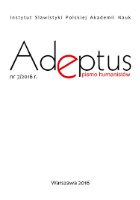
Adeptus
Illuminating the Depths of Slavic Languages and CulturesAdeptus is a pioneering open-access journal published by the Polish Academy of Sciences, Institute of Slavic Studies, specializing in Slavic studies and cultural research. Since its inception in 2014, the journal has aimed to foster scholarly dialogue and advance knowledge across various disciplines related to Slavic languages, literature, history, and sociology. With an ISSN of 2300-0783, Adeptus has positioned itself as a vital resource for researchers, professionals, and students engaged in Slavic studies, offering a platform for high-quality, peer-reviewed articles that explore diverse topics within the field. The journal's open-access model promotes accessibility and dissemination of knowledge, making it a significant contributor to the academic landscape. Located in Warsaw, Poland, Adeptus continues to thrive as a key outlet for innovative research, inviting submissions that embody rigorous scholarship and insightful perspectives.
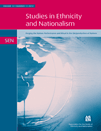
Studies in Ethnicity and Nationalism
Exploring the Dynamics of Identity and BelongingStudies in Ethnicity and Nationalism, published by WILEY, is a prestigious academic journal that serves as a vital forum for the exploration and dialogue surrounding issues of ethnicity, nationalism, and identity in today’s globalized society. With an ISSN of 1473-8481 and E-ISSN 1754-9469, this journal not only addresses theoretical frameworks but also provides empirical research essential for understanding complex social dynamics. Holding a commendable Q3 ranking in the fields of Sociology and Political Science, and positioned at the 57th percentile among its peers, it boasts a significant impact on contemporary scholarly discourse since its inception in 2001. Although it does not currently offer an Open Access option, it remains dedicated to publishing high-quality, peer-reviewed research that contributes to policy-making, academic scholarship, and the broader public understanding of ethnicity and nationalism. Researchers, professionals, and students can benefit immensely from the insights provided in this journal, making it an essential resource for those engaged in the social sciences.

Anales de Literatura Hispanoamericana
Connecting Scholars Through the Lens of Hispanic LiteratureAnales de Literatura Hispanoamericana, published by UNIV COMPLUTENSE MADRID, SERVICIO PUBLICACIONES, is a prominent journal dedicated to the field of Hispanic literature and literary theory. With a history of publication spanning from 1996 to 2023, this journal provides an essential platform for scholars and researchers exploring diverse aspects of literature within the Hispanic cultural context. Though it currently operates without an open-access model, its scholarly contributions are vital for advancing the understanding of literary phenomena in Spanish-speaking countries. As a Q3 ranked journal in the Literature and Literary Theory category, it engages a global audience interested in high-quality research, and its Scopus ranking places it among the notable publications in the arts and humanities. The journal aims to foster interdisciplinary dialogue, showcasing innovative research and critical analyses that enhance the appreciation of Hispanic literary heritage. Whether you are a seasoned researcher or an emerging scholar, Anales de Literatura Hispanoamericana serves as a crucial resource for advancing your understanding of the rich tapestry of Hispanic literature.
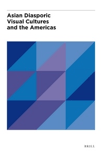
Asian Diasporic Visual Cultures and the Americas
Advancing Interdisciplinary Insights into Visual CulturesAsian Diasporic Visual Cultures and the Americas is a pioneering journal published by BRILL, dedicated to exploring the intersections of visual culture, identity, and diaspora within the context of the Americas. With an ISSN of 2352-3077 and E-ISSN of 2352-3085, this journal has established itself as a significant resource for academics, researchers, and students interested in the visual arts and their broader social implications. Since its inception in 2015, the journal has been committed to fostering interdisciplinary dialogue, providing a platform for innovative research that examines how Asian diasporic communities express their identities through visual mediums. Despite its relatively recent establishment, it endeavors to challenge and expand the narratives related to visual arts in a diverse and globalized world. Though the journal currently does not offer open access options, it remains a vital asset for those engaged in understanding the critical dynamics of race, ethnicity, and culture in contemporary visual practices. Converging insights from both the arts and social sciences, this journal invites contributions that illuminate the complexities of diasporic experiences, making it a pertinent choice for those aiming to contribute to this evolving field.

Papers on Social Representations
Exploring the Dynamics of Social Identity and CommunityPapers on Social Representations (ISSN: 1021-5573) is a distinguished academic journal published by the University Institute of Lisbon ISCTE-IUL, based in Portugal. Specializing in the evolving field of Social Psychology, this journal plays a pivotal role in disseminating innovative research and theoretical advancements that shape our understanding of social representations, identity, and community dynamics. With a 2023 Scopus ranking placing it in the 54th percentile among its peers (Rank #141/310), its contributions are recognized within the academic community as essential for fostering interdisciplinary dialogue. The journal operates on a Q3 quartile in 2023, indicating its growing influence and relevance. With a commitment to open access principles, it ensures that research is readily available to diverse readerships, thereby enhancing the reach and impact of scholarly work. Covering a continuum from 2016 to 2024, this journal not only acts as a repository for pioneering studies but also encourages emerging researchers and practitioners to engage with transformative concepts in Social Psychology.
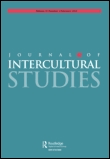
Journal of Intercultural Studies
Charting New Territories in Cultural ResearchWelcome to the Journal of Intercultural Studies, a premier publication in the fields of Cultural Studies, History, Sociology, and Political Science, brought to you by Routledge Journals, Taylor & Francis Ltd. With an impressive Q1 ranking in both Cultural Studies and History, as well as a solid performance in Sociology and Political Science, this journal stands as a vital resource for researchers, academics, and students seeking to explore the complexities of intercultural engagement and historical narratives from 1980 to 2024. Indexed in Scopus with high percentiles, the journal not only contributes to scholarly discourse but also facilitates access to a diverse range of interdisciplinary insights. While it currently does not offer open access, its comprehensive studies and authoritative articles are indispensable for those committed to understanding the nuances of cultural interactions and their societal implications.

Camino Real-Estudios de las Hispanidades Norteamericanas
Unveiling Cultural Narratives of North America’s Hispanic HeritageCamino Real-Estudios de las Hispanidades Norteamericanas is an esteemed journal published by the Universidad de Alcalá, Instituto Franklin de Investigación Norteamericanos, focusing on the interdisciplinary study of North American Hispanic studies. With a dedicated mission to advance scholarship in this emerging field, the journal serves as a crucial platform for researchers, academics, and students interested in exploring the cultural, historical, and social dynamics of Hispanic populations in North America. While the journal does not currently operate under an Open Access model, it is committed to rigorous peer review and upholding academic standards that are essential for quality research dissemination. Situated in Alcalá de Henares, Spain, this journal not only contributes to the understanding of Hispanic influences in North American contexts but also strengthens the dialogue between diverse scholarly communities, making it a valuable resource for anyone engaged in this vital area of study.